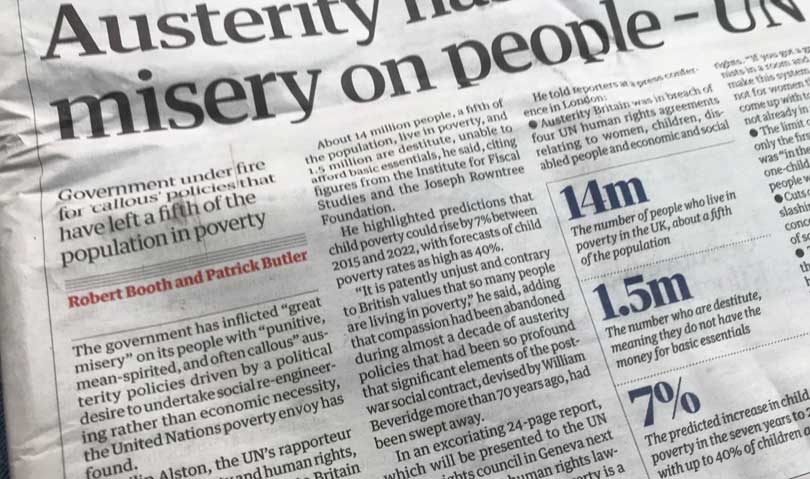We are just now returning from our trip to England and Scotland, after conducting a range of amazing interviews for our film — with inspiring people both in Scotland and in England. At the same time, we couldn’t help but notice the ripples of political shockwaves rolling through the United Kingdom. The most obvious one being Brexit, of course, which was incredibly hotly debated right when we were in Edinburgh and Glasgow. The PM Theresa May had just presented the results of her negotiations with the EU in Parliament, and all the media were (and still are) full of the ensuing debate. But on Saturday, I got an even greater shock when I picked up an issue of the Guardian.
The front page article was about a report from the “UN rapporteur on extreme poverty and human rights”, Philip Alston. He had completed a two-week mission to Britain, following up earlier indications that the situation of the poor and their numbers in the UK were highly alarming. His current report confirms that the situation is dire — after years of austerity policies. Even worse, according to his reporting, the situation is not just unfortunate or tragic, it is the will of the ruling political establishment in Britain.
14 million people in the UK live in poverty — that is one fifth of the population. 1.5 million are destitute — they do not have the money for basic essentials.
And that is happening in the fifth-largest economy of the world, with record numbers of millionaires and billionaires. The size of the issue is hard to even comprehend.
Here are a few quotes from the article:
The government has inflicted “great misery” on its people with “punitive, mean-spirited and often callous” austerity policies driven by a political desire to undertake social re-engineering rather than economic necessity, the United Nations poverty envoy has found.
In others words: a UN official literally says that the British Government is deliberately cruel to poor people.
… compassion had been abandoned during almost a decade of austerity policies that had been so profound that significant elements of the post-war social contract (…) had been swept away.
In other words, the British Government is ripping apart the fabric that holds society together, by giving more to the rich and not caring at all about the poor.
In [his] report (…), the eminent human rights lawyer said that in the UK, “poverty is a politicial choice”.
And we are talking here of the world’s fifth largest economy!
(…) Alston said that the problems were “obvious to anyone who opens their eyes to see the immense growth in food banks and the queues waiting outside of them, the people sleeping rough in the streets, the growth of homelessness, the sense of deep despair that leads even the government to appoint a minister for suicide prevention and civil society to report in depth on unheard-of levels of loneliness and isolation”.
The British Government has a minister for suicide prevention! And yet they don’t think that there is a problem:
The ministers he met (…) were almost entirely dismissive of criticisms of welfare changes and universal credit, he said. Instead they described critics as political saboteurs, or said they failed to understand how it worked.
Scotland is one of the example countries that our film will speak about. And the local Scottish Government is apparently trying to do what it can to work against the horrible effects of the political decisions coming from London:
(…) authorities in Scotland and Northern Ireland are frantically trying to devise ways to ‘mitigate’, or in other words counteract, at least the worst features of the government’s benefits policy (…)
The way many economists and policy-makers think is not only deeply troubling because it is destroying our planet. It’s also deeply troubling because it is destroying people.
That is why we are making our film about Wellbeing Economies. Because this insanity needs to end, and we want to help tell that story.


One reply on ““In the UK, ‘poverty is a political choice.'””
[…] we are no longer creating good and prosperous societies that way. Just the other day we had posted a text that shows how the UK is actually promoting povery with the way politics are making decisions there — decisions that are being taken to promote primarily economic […]